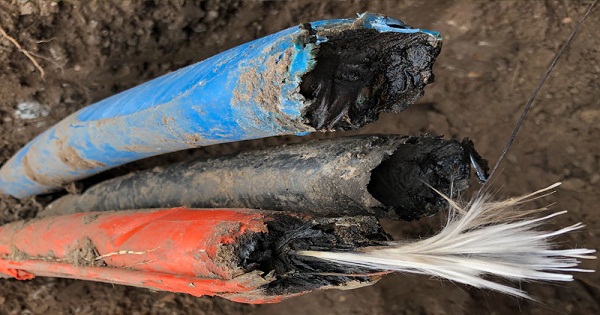Telecom
FATE Foundation, Facebook to Implement AEP-Digital in Seven Cities Across Nigeria

FATE Foundation, Nigeria’s foremost enterprise knowledge and development organization in collaboration with Facebook, announced the implementation of the second Series of the FATE Foundation Aspiring Entrepreneurs Digital Programme (AEP-Digital)in seven cities across Nigeria.
With the AEP-Digital program, FATE Foundation and Facebook will provide the foundational entrepreneurial knowledge that is relevant in an ever-growing digital climate, with each of the eight streams of the program running for four weeks.
Following the first stream of the program, which was completed in Lagos, the AEP-Digital train is on the move to Ilorin and will continue to all the other target cities before the end of the year.
The program is inspired by the need to contribute to wealth and job creation in Nigeria by fostering new business developments.
All this stems from the research on sustainability of startups in Nigeria which indicates that entrepreneurs struggle to survive their first five years of business because they lack the fundamental business knowledge regarding accounting, finance, marketing, human resource management and other aspect of a successful business structure.

FATE Foundation in Ilorin.
Adenike Adeyemi, Executive Director, FATE Foundation, said that, “The advent of social media and its effect on digital marketing, customer service, people management, market and competitor research, as well as other digital solutions for accounting and payment management, have added to the relevance of a digital component to the training which has only resulted in enhancing and deepening the richness and impact of the program which is one of the reasons for the partnership with Facebook”.
She added that research has shown that startup businesses are essentially in search of viable business models during the teething stage characterized by problems arising from the absence of the right processes and structures for their business.
The program goes further to provide support regarding funding linkages, access to markets, and growth strategies among others in class sessions.
The target cities; Lagos, Ilorin, Port Harcourt, Benin, Abeokuta, Kaduna and Aba, were selected to enable more entrepreneurs around Nigeria have access to these much-needed, best-practice entrepreneurial know-how particularly for businesses in the Nigerian context, as well as provide research-driven support for businesses to start, grow and scale.
Prospective applicants can visit the FATE Foundation website: www.fatefoundation.org/aep, for more information on application, commencement and closing dates and follow them on all their social media platforms for regular updates.
Telecom
Telecom Subscribers Decline By 43m in One Year

At least 43 million lines were disconnected from networks service providers for non compliance with the National Identification Number (NIN) SIM linkage policy of the federal government, report has revealed.

The number of teleocm subscriber in the country fell by 43.7 million subscribers from 216,974,742 in April 2024 to 172,948,309.
This effectively reduced teledensity from 100.09 per cent to 79.78 per cent.
Teledensity is calculated based on Nigerian Population Commission’s projected population figure of 216 million, according to the NCC.
A breakdown showed that Airtel subscribers dropped from 62,933,351 in April 2024 to 58,586,914 in April 2025.
Globacom witnessed a drop from 62,055,248 in April 2024 to 20,607,726 in April 2025.
The amount of customers lost by Globacom was 20,607,726 making it the biggest loser.
9Mobile subscribers dropped to 2,964,445 in April 2025 from 8,956,568 subscribers in April 2024.
However, MTN Nigeria Communications was the only teleocm company that survived the shock.
MTN saw a rise in its subscribers from 82,716,236 in April 2025 to 90,508,170 in April 2025.
Analysis showed that the 43.7 million subscribers’ loss was a result of the disconnection of unregistered lines.
“The removal of Subscriber Identification Modules (SIMs) that are not linked to verifiable National Identification Numbers (NINs) and the rectification of a major discrepancy by a Mobile Network Operator explain the significant drop in Nigeria’s telecoms subscriber base,” the regulator explained in the report.
In 2022, the Ministry of Communications and Digital Economy announced the NIN-SIM linkage policy was for national security and accuracy of the national SIM ownership database.
Subscribers whose lines were not associated with a verified NIN were advised to complete NIN verification to reactivate their lines.
After multiple deadlines for compliance, the NCC set a final deadline of September 14, 2024, for Mobile Network Operators (MNOs) to complete the linkage process.
Telecom
IHS Nigeria, NSCDC Partner to Protect Telecoms Infrastructure

IHS Nigeria, a subsidiary of the IHS Towers group, announced on Thursday it has formed a strategic partnership with the Nigeria Security and Civil Defence Corps (NSCDC) to increase protection of critical telecoms infrastructure across Nigeria.

Under an MoU signed by both organizations, IHS Nigeria and the NSCDC plan to develop and implement strategies aimed at safeguarding IHS Nigeria’s assets and other telecoms infrastructure from theft and sabotage.
IHS Nigeria owns and operates over 16,000 towers in Nigeria and has deployed over 15,000km of fibre.
The NSCDC will aim to support IHS Nigeria for areas such as site surveillance, emergency responses and incident reporting.
That includes assisting in matters related to tower decommissioning as well as investigating, apprehending and prosecuting alleged site violators.
Mohamad Darwish, CEO, IHS Nigeria, said the collaboration with NSCDC was a key step to enhancing the resilience, reliability and availability of telecoms connectivity in Nigeria.
“By working closely with the NSCDC, which enforces the law that designates telecommunication towers as critical national information infrastructure, we aim to create a safer and more secure environment for our operations, including our infrastructure, and more importantly, ensure better quality of service for all users in Nigeria,” he said in a statement.
Vandalism and theft of fibre cables, backup batteries and other telecoms infrastructure has been a growing problem in Nigeria – so much so that Nigerian president Bola Tinubu declared telecoms infrastructure to be Critical National Information Infrastructure (CNII) via an executive order last year.
Telecom
NCC Orders Telcos to Compensate Subscribers for Outages More than 24 Hours

Nigerian Communications Commission (NCC) has issued a fresh directive mandating telecom operators to compensate subscribers when major service outages last longer than 24 hours.

The commission also mandated telecom licensees in Nigeria to inform consumers of major service outages on their networks through media channels, stating the cause(s) of the service interruption, and the area(s) affected by the service interruption/outage, as well as the time that would be taken to restore service.
Consumers must also be informed one week in advance where operators have planned service outages.
This development, contained in the “Directive on Reportage of Major Network Outages by Mobile Network Operators (MNOs),” is part of the Commission’s drive to ensure timely resolution of outages, enhance quality of experience for telecom consumers, and keep consumers informed.
According to the Directive, Mobile Network Operators, Internet Service Providers and other operators that provide last mile services will also provide proportional compensation, including extension of validity, as may be applicable and in line with the provisions of the Consumer Code of Practice Regulations, where any major network outage continues for more than 24 hours.
It identifies three types of major outages to include: Any network operational condition such as fibre cut due to construction/access issues/theft & vandalism and force majeure that impacts five per cent or more of the affected operator’s subscriber base or five or more Local Government Areas (LGAs); having an occasion of unplanned outage of, or complete isolation of network resources in 100 or more sites or five per cent of the total number of sites (whichever is less) or 1 cluster that lasts for 30 minutes or more; and lastly, any form of outage that can degrade network quality in the top 10 states based on traffic volume as specified by the Commission from time to time.
In furtherance of this, the Commission has further directed that all Major Outages are to be reported by operators through the Commision’s Major Outage Reporting Portal, which is accessible to the public through the Commission’s website, www.ncc.gov.ng. The portal additionally discloses the identity of the culprit responsible for the disruption.
Commenting on the Directive and the Major Outage Reporting Portal, the Director, Technical Standards and Network Integrity, Engr. Edoyemi Ogor stated that, “The Commission has trialed the reporting process and portal with operators for some months now before issuing the directive.
“By providing consumers and stakeholders in the telecommunications industry with timely and transparent information on network outages, we are entrenching a culture of accountability and transparency. This approach also ensures that culprits are held responsible for sabotage to telecommunications infrastructure.
“This also aligns with our broader commitment to the effective implementation of the Executive Order signed by President Bola Ahmed Tinubu, which designates telecommunications infrastructure as Critical National Information Infrastructure (CNII). It reinforces the need to safeguard these assets, given their centrality to national security, economic stability, and the everyday lives of Nigerians,” Engr Edoyemi Ogor said.

 E-Financial2 days ago
E-Financial2 days agoNGX Clears Fidelity Bank MD of Insider Trading Allegations

 News2 days ago
News2 days agoToll Collection on Lagos-Calabar Highway Begins December

 Telecom4 hours ago
Telecom4 hours agoNCC Orders Telcos to Compensate Subscribers for Outages More than 24 Hours

 E-Financial4 hours ago
E-Financial4 hours agoSERAP Drags CBN to Court over Alleged Failure to Disclose LG Allocations

 Telecom4 hours ago
Telecom4 hours agoTelecom Subscribers Decline By 43m in One Year

 E-Business4 hours ago
E-Business4 hours agoNigeria Launches Cybercrime Team with Commonwealth, UK Support

 General News4 hours ago
General News4 hours agoHEDA Sues FG, Oil Giants over Alleged Unlawful Oil Licence Transfer

 Telecom4 hours ago
Telecom4 hours agoIHS Nigeria, NSCDC Partner to Protect Telecoms Infrastructure























